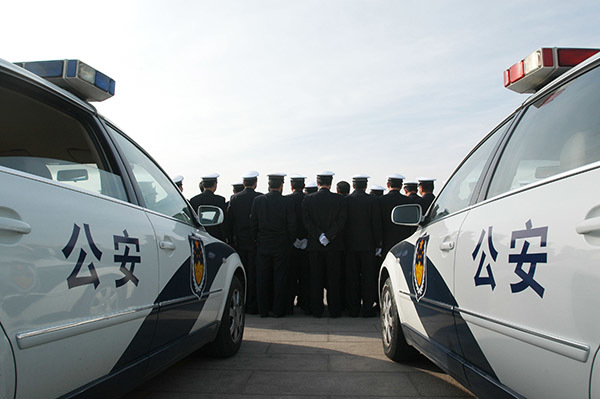On September 8, 2025, an X (formerly Twitter) user exposed a scandal in Dafanpo, Qin’nan District, Guangxi, where a brick factory had long been illegally forcing disabled people into labour. (Video screenshot)
[People News] The Chinese Communist Party (CCP) operates one of the world’s largest and most sophisticated surveillance networks, such as the “Skynet Project,” claiming it leaves criminals nowhere to hide. Yet despite this vast monitoring system, cases of missing youth, kidnapped children, and disabled individuals enslaved as forced labourers have repeatedly surfaced for years. The public security system and Skynet often act blindly, while the CCP authorities turn a blind eye.
Recently, a string of cases involving factories illegally forcing disabled people to work has shocked the public.
According to social media whistleblower Li Ying, who lives in Europe, a brick factory in Dafanpo, Qin’nan District, Guangxi, illegally forced disabled individuals to work for years. Under the control of a foreman surnamed Wang, five disabled workers had been forced to labour for up to five years, carrying bricks in scorching heat for over 12 hours a day. Their only food was vegetables and steamed buns—“five years without eating meat.” They received no wages, as Wang pocketed all the money. Only one worker, who could do basic calculations, received 500 yuan per month.
Workers were guarded by two so-called “big brothers” armed with weapons. When sick, they were only given painkillers. Anyone who resisted was beaten or even chained.
Wang admitted there were originally eight workers, but three were abandoned on a highway when they became too sick or injured. He said bluntly: “Once you throw them away, you don’t care anymore.”
On September 7, police acted on a tip, intercepting Wang as he tried to move the workers. Ten victims were rescued. The factory was shut down, its operator detained, and two fugitive overseers are being hunted. Authorities are now working to identify the victims.
Since 2015, more than 50 brick factories across Hunan, Henan, Shanxi, Guangxi, and other provinces have been implicated, with nearly 400 disabled people tricked, trafficked, or violently kidnapped and forced into long-term unpaid labour—forming a nationwide chain of slave-labor brick kilns.
In another case exposed by well-known activist “Shangguan Zhengyi” on June 4, a brick factory in Linxiang, Yueyang (Hunan Province) used multiple mentally disabled men as slave labourers. They carried bricks 12 hours a day, year-round, with no protective gear. When sick, they were only given painkillers. Most were between 40–50 years old, and some could not even speak. Their ID cards were confiscated, and their identities hidden. Though the factory claimed to pay 300 yuan a day, in reality, they only provided food—no wages.
Shortly after Shangguan reported the case to the police, the factory quickly used vans to transfer the disabled workers.
This sparked suspicion online: “Why did the factory move them right after the police were called? Was there an insider tipping them off?” “Isn’t it strange that right after a 110 call, the foreman immediately moved the workers? If this wasn’t a coincidence, someone must be protecting them or even profiting from the kiln. That explains why these slave-labor brick kilns have existed for years without punishment.”
Other netizens criticised the CCP for dereliction of duty and failing to provide even basic protection for disabled people: “If they don’t work, they starve. Who is helping them?” “Even if sent back home, what happens next?”
Tragic cases abound. Last year, a man from Guizhou went missing for 18 years after leaving home for work. He had been illegally held in a brick kiln. When he became partially paralysed and incontinent, he was abandoned by the roadside, where his family finally found him.
Back in 2011, undercover reporter Cui Songwang posed as a mentally disabled man and risked his life to infiltrate a brick kiln, exposing a boss who had enslaved 30 mentally disabled people.
All of this has unfolded despite China’s enormous surveillance network.
China’s Skynet Project is among the world’s largest video surveillance systems, with cameras covering every corner of cities, including public spaces, transportation, and residential areas. Viral footage has shown Skynet identifying vehicle types, colours, and pedestrians’ age, gender, and clothing in real time. Experts confirmed this is part of a real-time pedestrian recognition system that instantly displays data on screen—an essential component of Skynet.
In 2017, a police officer operating Skynet said on CCTV that their task was to detect early signs of potential crime, boasting that the system made criminals “nowhere to hide.”
But netizens sarcastically asked: “Can Skynet identify corrupt officials?” “Can it find missing children and women?”
Exposés about disabled people trafficked and enslaved in brick kilns date back 20–30 years, proving the CCP has long known about such crimes. The real issue is that authorities choose inaction, leaving the public both disappointed and furious.
As one netizen on X remarked: “Ninety per cent of enterprises in mainland China are just smaller versions of Myanmar’s Myawaddy! Working in China means working all day, with only eight hours of ‘rest’ that include eating, sleeping, and bathroom breaks. It’s the exact opposite of civilised countries. Why are Chinese goods so cheap? Because Chinese workers work even longer hours than beasts of burden.”











News magazine bootstrap themes!
I like this themes, fast loading and look profesional
Thank you Carlos!
You're welcome!
Please support me with give positive rating!
Yes Sure!